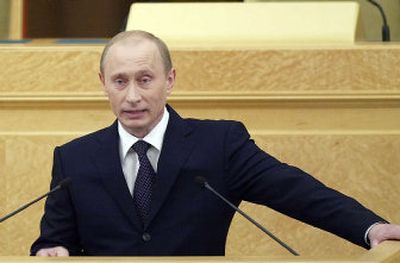Putin has blunt words for ‘Comrade Wolf’

MOSCOW – President Vladimir V. Putin, in a blunt response to U.S. criticism of his domestic and foreign policies, declared Wednesday that Russia will boost its military strength to ensure its ability to resist foreign pressure.
In an annual address to parliament, Putin said new nuclear and high-precision weapons will enable his country to maintain a strategic balance with the United States, which he compared to a wolf – the arch-villain of Russian fairy tales – doing as it pleases in the world.
“As they say, ‘Comrade Wolf knows whom to swallow,’ ” Putin said. “He swallows without listening to anyone. Nor does he intend to listen to anyone, judging by all appearances.”
Putin’s comments did not seem to signal a return to Cold War hostility so much as a bid by an increasingly self-confident Russia to engage in tough bargaining on international issues and to reject interference in its domestic politics.
In Washington, the White House reacted sharply to Putin’s address.
“We’re still analyzing the speech but we are disappointed that it did not address the concerns that many people have raised about Russia’s commitment to democracy and its use of economic pressure against its neighbors,” the White House said in a statement.
Moscow’s fresh assertiveness comes in part from rising oil prices, which have fueled strong economic growth in this energy-rich nation for the past seven years.
Putin said that despite recent increases in Russian military funding, the United States spends nearly 25 times more than Moscow. Putin went on to ridicule those who claim “the need to fight for human rights and democracy” when they actually have “the need to realize their own interests.”
Putin’s remarks implied criticism of such U.S. policies as the invasion of Iraq to topple former President Saddam Hussein, which Moscow opposed. His words also appeared to be a response to American accusations that Russia has curtailed democratic freedoms at home and attempted to bully neighboring former Soviet states on issues such as energy supply and territorial integrity.
Speaking to Eastern European leaders in Vilnius, Lithuania, on May 4, Vice President Dick Cheney declared that Russia’s government had “unfairly and improperly restricted the rights of her people,” and accused Moscow of using the country’s gas and oil reserves as “tools of intimidation or blackmail.” Cheney also criticized Russia’s support for separatist enclaves in Georgia and Moldova.
Putin said Wednesday that because the United States so heavily outspends Russia in the military sphere, Moscow’s aim is not to match U.S. forces in quantitative terms.
“We should not burn money uselessly,” he said. “Our responses should be based on intellectual superiority. They will be asymmetric, less costly, but they will undoubtedly make our nuclear triad more reliable and effective.”
Over the next five years, Russia will “substantially increase the provision of strategic nuclear forces with modern long-range planes, submarines and launchers,” Putin said. “Along with the means of overcoming the systems of anti-missile defense, which we already have, new types of weapons enable us to preserve what is undoubtedly one of the most important guarantees of lasting peace, namely, the strategic balance of forces.”
Despite the strong language on international and military issues, the bulk of the speech focused on domestic policies.
Putin called for wide-ranging measures to reverse Russia’s sharp population decline by providing financial incentives for women to have more babies to help stem a population drop of about 700,000 per year. Putin called his nation’s post-Soviet demographic decline the country’s “most acute problem.”
He called for better health care, increased birthrates, and the encouragement of immigration by “educated and law-abiding people” as ways to address the problem. He put particular emphasis on financial incentives for women to have a second child.
Putin’s most dramatic proposal was that payments of nearly $10,000 be made to women who have a second child. He suggested the money could be used to acquire housing, for the children’s education or for the mother’s own pension.